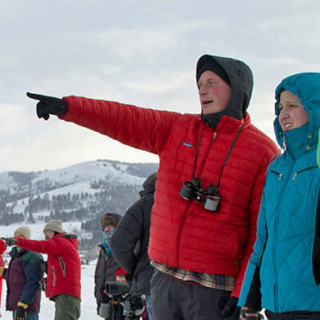Student Spotlight: Michaela Shifley
Michaela Shifley is a Ph. D. candidate in cultural heritage and applied anthropology in the College of Humanities and Sciences. Her research focuses on the footwear of Northern Plains Indians and connecting communities with their historical objects. Her work emphasizes that museum collections should not stand apart from their communities. Shifley was awarded a Recovering Voices grant from the Smithsonian, which allowed her to partner with the Blackfeet Nation's Tribal Historic Preservation Office where she is currently working to return historical objects and documents from Washington D.C. to the Blackfeet community.
STORY TRANSCRIPT
I grew up in Laurel Montana on the eastern side of the state. I'm like, ah fourth generation Montanan. I am the first person in my family to receive a graduate degree. And I come from a bunch of farmers and ranchers. I grew up really close with my grandparents and they are the ones you know, they told me stories growing up about their families, homesteading.
My grandma is from Italy. And, you know, they're kind of like the American dream, if you'd like to say that. Uh, homesteaded in eastern Montana, knew the value of hard work. And they really taught me about my heritage and my history, and that's part of what inspired me to go into cultural heritage as a field.
My research aims to rectify the silence surrounding Northern Plains footwear. But more importantly, my work focuses on connecting communities with their objects and museums and emphasizing that museum collection should not stand apart from their communities.
Part of what I'm doing is taking those moccasins out of these museum spaces and asking them what their stories are. And then the second part, the most important part, in my opinion, is going to the community and saying, or asking them to talk about not only these moccasins, but also these artistic traditions that have persevered throughout time and, and what they're doing today. With not just moccasins, but arts and culture and reviving traditional knowledge and language and how all of these things tie in with one another.
The University of Montana is very supportive of research. Their program really drew me, their anthropology program really drew me. Particularly my advisors, Kelly Dixon and Riley Auge, were a really big draw. Kelly in particular has been really vocal about returning knowledge to communities and making sure that they're in charge of the things that are said about them and the projects that are done with their history.
I'm working primarily with the Niitsitapi, which are the, the Blackfoot Confederacy. Really focusing on the Piikani, the Amskapi Piikani, or the southern Blackfeet, i.e. the Blackfeet Nation here in Montana. To date, we have formed a really strong partnership in many ways. I'd received a grant from the Smithsonian Institution called a “Recovering Voices” grant. And so, I'm partnering up with some community leaders including the Tribal Historic Preservation Office of the Blackfeet Nation. And, we're going to Washington, D.C. for them to look at their stuff and to look at their documents and bring that back to the community.
One thing I think about a lot that Kelly Dixon told me is that because I was telling her, it's a lot of pressure to complete a dissertation, carrying the weight of other people's expectations and wanting to make sure that your stakeholders, that your people are not only heard but are leading. And she told me that pressure is good, because it makes sure that you do good.
With indigenous communities, you can return some of the knowledge that has been stolen from them that has been lost from them by just doing projects in general like for myself, in terms of museum work, creating exhibits that really capture people's voices, creating exhibits that you're collaborating on, that you're not taking control of, but that you're letting other people's voices dictate what you're doing because that's their history.
